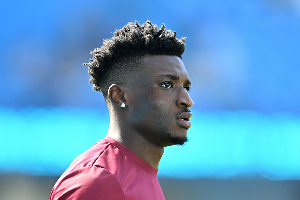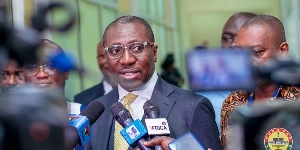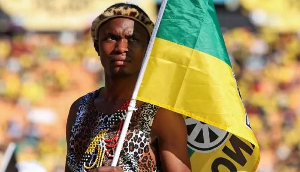- Home - News
- TWI News | TV
- Polls
- Year In Review
- News Archive
- Crime & Punishment
- Politics
- Regional
- Editorial
- Health
- Ghanaians Abroad
- Tabloid
- Africa
- Religion
- Election 2020
- Coronavirus
- News Videos | TV
- Photo Archives
- News Headlines
- Press Release
General News of Tuesday, 20 October 2009
Source: GNA
CEDAW a mouthpiece for women
Accra, Oct. 20, GNA - Five per cent of the Metropolitan, Municipal District Assemblies' (MMDAs) Common Fund (ACF) has been dedicated for gender work, Ms Dorothy Onny of Ministry of Women and Children's Affairs (MOWAC), said in Accra on Tuesday.
She said it was made possible by the introduction of gender responsive budgeting to ensure adequate resource allocation for gender equality programmes.
Ms Onny was presenting a paper on the concluding comment to Ghana from the Convention on the Elimination of All Forms of Discrimination against Women (CEDAW) which the country ratified in July.
President John Atta Mills in his State of the Nation Address on assumption of Office promised that MOWAC would witness a significant budget increase and be strengthened to establish Gender Units in all District Assemblies and also provide MOWAC with the capacity to function optimally. Now, there is a growing goodwill from the Ministry of Finance and Economic Planning (MOFEP) towards MOWAC regarding the promotion of gender mainstreaming and gender responsive budgeting.
The workshop organized for civil society organisations (CBOs) was to strategise for the Convention on the Elimination of Discrimination against Women (CEDAW), the next CEDAW report as well as encourage the use of the Optional-CEDAW and sensitise participants on the Convention. The CEDAW is the first and only human right convention that obliges states to modify and abolish social attitudes and cultural patterns and practices that are based on the idea of inferiority or superiority of either sex.
Ghana's assessment is expected to create a platform for the re-engineering of MOWAC and provide information on institutional frameworks, systems and capacity needs/gaps to facilitate institutional reforms in order to better position MOWAC to implement the National Gender and Children's Policy.
Dr Dorcas Coker, Ghana's Member of the CEDWA, said the CEDAW Committee frowned on any form of discrimination against women and noted that the committee explicitly prescribed states-parties obligation to eliminate discrimination against women not only by state agents, but also by private individuals, organizations or enterprises.
CEDAW, she said, demanded a gender sensitive rights based approach that required that all interventions for women by states would be based on the principles of the universality, inter-relatedness and inter-dependence of rights adding that the CEDAW principles ensured that women were accorded the same human right as men.
The committee, she said, was composed of 23 experts who were elected by secret ballot from a list of persons of high moral standing whose mandate was to monitor progress made in implementation of the convention so that women who had been discriminated against and had not received fair trials at the highest level of justice could send their complaints to CEDAW to help them out.
Ms Bernice Sam, National Programmes Coordinator WiDAF Ghana, took participants through the mid-term review process the Commonwealth Plan of Action for Gender Equality (CPoA) and shadow reporting from civil society to the CEDAW Committee.
The Optional CEDAW (op- CEDAW) is among the international conventions that Ghana has ratified to promote gender equality and women's empowerment in the country.
Ghana, she said, was obliged to submit a comprehensive report on her implementation of the Articles in the CEDAW document adding that Ghana submitted her first and second CEDAW Reports in 1991 and 1992 respectively with a combined 3rd, 4th and 5th reports which covered the period 1993 - 2003 also being submitted to the Committee in January 2005. Ghana was expected to submit a progress report to the Ninth Women's Ministers' meeting in June 2010 in Barbados. The report provides the following information among other updates on Ghana's socio-economic and political environment - the position and status of women in Ghana since the submission of the first and second reports and strategies for promoting the advancement of women and the Beijing Platform for Action.
Board Chairman of WiDAF, Dr. Cherub Antwi-Nsiah, noted that countries that ratified international conventions were obliged to take the necessary steps to comply and submit periodic reports in demonstrating compliance. He called for consensus building among gender-based organizations to enable them to appreciate and use the UN Convention and the Op-CEDAW. Ghana's endorsement of (CPoA) (2005-2015) provided the framework within which the commonwealth will advance its commitment to gender equality and equity.
CPoA dealt in four critical areas, namely, Gender, democracy, peace and conflict; Gender, human right and law; Gender, poverty eradication; and gender and HIV and AIDS.










